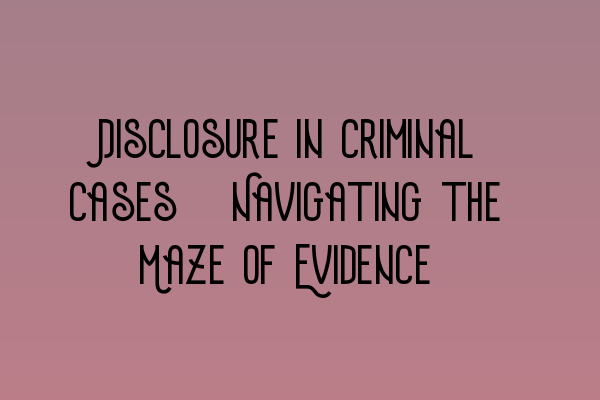Disclosure in Criminal Cases: Navigating the Maze of Evidence
Welcome to the SQE Criminal Law & Practice Law UK blog. Today, we are going to delve into the complex topic of disclosure in criminal cases. Disclosure, also known as the disclosure of evidence, plays a crucial role in ensuring a fair trial. It refers to the process of sharing evidence between the prosecution and the defense in a criminal case.
The Importance of Disclosure
In the criminal justice system, both the prosecution and the defense have a duty to disclose all relevant evidence to each other. This duty is fundamental to ensuring a fair trial, as it allows the defense to adequately prepare their case and challenge the evidence presented by the prosecution. Without proper disclosure, there is a risk of miscarriages of justice and wrongful convictions.
Disclosure includes not only the evidence that the prosecution intends to rely on, but also any evidence that may undermine their case or support the defense’s case. This includes witness statements, expert reports, police reports, CCTV footage, and any other material that may be relevant to the case.
The Challenges of Disclosure
Disclosure can be a complex and time-consuming process. The sheer volume of evidence in some cases can be overwhelming, making it difficult for both the prosecution and the defense to review and assess all the materials. Additionally, there may be sensitive or confidential information that needs to be protected.
One of the challenges of disclosure is determining what is considered as “relevant” evidence. This requires a careful analysis of the case law and legal principles. It is crucial for both the prosecution and the defense to be thorough in their review of the evidence to ensure that nothing is overlooked.
Navigating the Disclosure Process
To navigate the maze of evidence and ensure effective disclosure, it is important to follow a systematic approach. Here are some key steps:
- Understanding the Legal Requirements: It is essential to have a clear understanding of the legal requirements for disclosure. Familiarize yourself with the relevant legislation, rules, and guidelines.
- Gather and Review the Evidence: Thoroughly gather and review all the evidence in the case. This includes both information that supports the prosecution’s case and potentially exculpatory evidence.
- Assess the Relevance: Carefully assess the relevance of each piece of evidence. Determine its probative value and whether it is admissible in court.
- Prepare a Disclosure Schedule: Create a disclosure schedule that lists all the evidence to be disclosed, specifying its nature and source.
- Prepare Statements of Unused Material: Identify any material that, although not deemed relevant, still needs to be disclosed under the prosecution’s duty.
- Exchange Disclosure with the Other Party: Share the disclosure schedule and statements of unused material with the other party. This can be done through formal channels, such as court orders or by agreement between the parties.
- Review the Other Party’s Disclosure: Carefully review the evidence disclosed by the other party, seeking any potential weaknesses or new lines of inquiry.
By following these steps, you can navigate the disclosure process efficiently and effectively, ensuring that all relevant evidence is disclosed and thoroughly analyzed by both sides.
Resources for SQE Exam Preparation
If you are preparing for your SQE exams, we have a range of resources and courses available to help you succeed. Check out the following links for more information:
- SQE 1 Practice Exam Questions
- SQE 1 Practice Mocks FLK1 FLK2
- SQE 2 Preparation Courses
- SQE 1 Preparation Courses
- SRA SQE Exam Dates
At SQE Criminal Law & Practice Law UK, we are committed to helping you excel in your legal career. Whether you are a law student or a qualified solicitor, our resources and courses are designed to provide you with the knowledge and skills you need to succeed.
Thank you for reading our blog post on disclosure in criminal cases. Stay tuned for more informative articles on various aspects of criminal law and practice. If you have any questions or would like to learn more about our services, please feel free to contact us. Good luck with your studies and legal endeavors!
